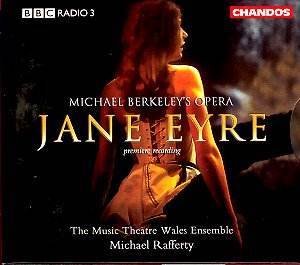This opera made headline news before it was even finished. The
virtually complete manuscript was stolen from the composer’s car, necessitating
a reconstruction and re-think. From this crisis, it appears Berkeley and
David Malouf (his librettist) ended up with an adaptation of a long Gothic
novel that is tight, concentrated and, most importantly, dramatically
effective. As American composer Bernard Herrmann found when he made an
opera out of Wuthering Heights, there is so much in these books
that simply making a workable libretto is a mammoth task. Berkeley’s opera
is not perfect, and lovers of the Brontë original will no doubt bemoan
the excision of their favourite bits (such as the Rivers sub-plot, or
Jane’s desolate, early years), but the end result makes for a compelling
night in the theatre, as well as a reasonably compelling listen on disc.
The truth is that people were always going to find
good and bad in this venture. The sheer popularity of the book would
probably give it a helping hand with audiences (it has proved extremely
popular), but criticism from purists was inevitable. Also, finding a
suitable musical language for this quintessentially 19th
Century novel must have been daunting. In the end, by stripping it down
to the bare bones of a timeless love story, Berkeley has been free to
be as eclectic or as experimental as the moment demands. Thus, there
are modern, sinewy dissonances, tritonic harmonies and orchestral glissandi
mixing with waltz parodies and soaring Puccinian melodies. The overall
impression, at least to me, is of a score somewhere between Britten
and Berg, with a nod (at the end) to Lloyd-Webber thrown in for good
measure.
I caught the opera on its regional tour, and there
is no doubt that the stage concept and design added enormously to its
success (it was all done with mirrors, as they say). As a purely aural
experience, it has its limitations, but things are certainly helped
by the quality of the playing and singing. Cast and band, after the
Cheltenham premiere and subsequent tour, are right inside the score,
managing some of Berkeley’s knottier textures and lines with consummate
skill and musicianship.
As Tom Service’s helpful note reminds us, one of the
more radical elements of the libretto is the attention given to the
character of the ‘madwoman’ in the attic, Mrs. Rochester. They have
been determined to make her a tragic, misunderstood figure, and the
psychological intensity that this engenders takes us close to the emotional
landscape of Wozzeck. Some of the angular, almost atonal melodic
lines accompanying her scenes are fin-de-siècle Vienna,
and the parodic material (snippets of Lucia di Lammermoor particularly),
serves to reinforce this (Berg’s opera is littered with such allusions).
The opera’s barely suppressed eroticism is another new light on the
novel, taking us somewhere close to the twilight world of Debussy’s
Pelléas et Mélisande. Britten’s Turn
of the Screw has also been mentioned by some critics, though I would
not want to suggest that any of these references make it a hotch-potch
of plagiarisms, simply that Berkeley’s models (and there aren’t many
better) seem to help define the music’s emotional landscape.
Andrew Slater gives the most rounded and vocally satisfying
performance of the cast, his warm, dark and secure baritone perfectly
suiting the character of Rochester. His moving aria ‘Listen Jane, hear
the rest of my tale’ is a good example of his many-layered characterisation,
shifting from a brusque, surly front to the real man beneath. As Jane,
Natasha Marsh has a pleasing voice, and shows more than just the vulnerability
we expect, giving a harder edge to her character where required. Their
final duet ‘Never again’ will, I guarantee, stick in your mind as readily
as anything in Richard Strauss or Puccini and, in the best traditions
of Romantic grand opera, is placed right at the end. The rest of the
cast acquit themselves well, though some of the cackles from the deranged
Mrs. Rochester sound uncomfortably like a pantomime witch, at least
on disc.
A special mention must be made of the chamber orchestra.
With only a dozen or so players, Berkeley conjures up some marvellous
sonorities, and with a band (and cast) of this size will probably be
assured of more performances. Michael Rafferty gets wonderfully detailed
and expressive playing from them, and this aspect is one of the highlights
of the disc. It is rather naughty of Chandos not to tell us it is a
live recording, though in truth there are no real drawbacks, as much
of the action is fairly static. Only in the conflagration scene towards
the end do we get the noise and stage bumps that can be problematic
for repeated listening on CD, and even here it is not for long.
To those who saw and enjoyed the opera in the theatre,
this will need no recommendation. To those who are curious as to what
Berkeley has done with one of our great literary masterpieces, I would
say you could safely risk the price of one disc. There is much to enjoy.
Tony Haywood


